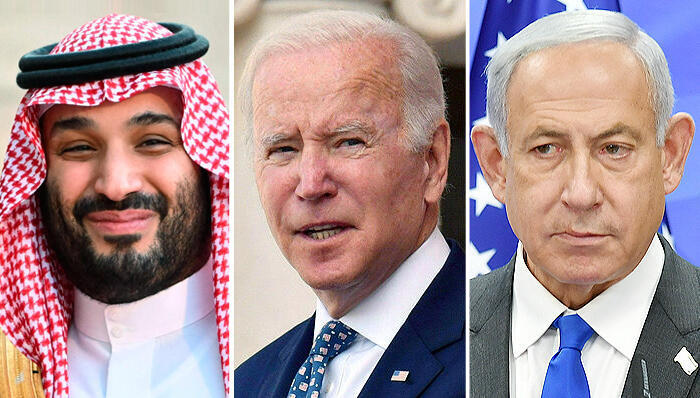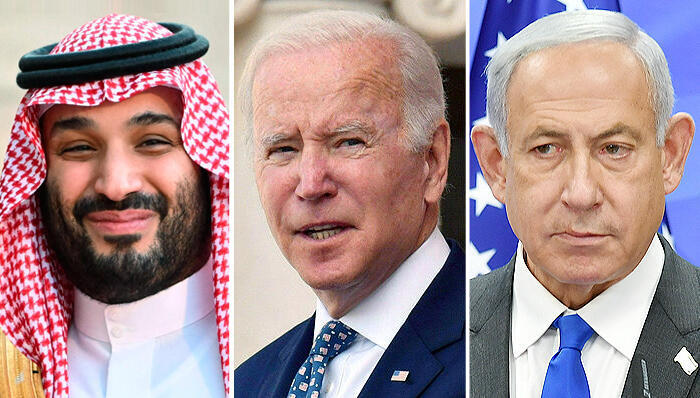
Why is Biden so excited about the ambitious transport project through Saudi Arabia?
Biden's announcement comes amid US efforts to counter China's growing influence in the region, as part of the ongoing trade war between the two countries
President Biden announced on Saturday a huge transportation project that would connect India, the Middle East, and Europe, via Israel. The White House has yet to provide specific details for the project including the budget and how it will be funded. However, it has received support from the governments of India, the United Arab Emirates, Saudi Arabia, the European Union, and, of course, Israel.
Although the details of this project have not been disclosed, it is likely to include a combination of overland railways integrated with shipping routes. One possible route involves goods leaving Western Indian ports, like Mumbai, being unloaded at Persian Gulf ports, like Saudi Arabia's Dammam or UAE ports, and then transported by rail through northern Saudi Arabia to Jordan, to Israel via the Sheikh Hussein Bridge, the port of Haifa and from there to the Mediterranean and Europe.
1 View gallery


Saudi Crown Prince Mohammed Bin Salman, President Biden and Prime Minister Netanyahu.
(Credit: AFP, Bertrand Guay/ AFP, Yoav Davidkovich)
Currently, this route cannot be implemented due to the lack of relevant railway infrastructure in Jordan, which uses a narrow-gauge railway based on the Ottoman-era Hejaz Railway. This project would require the development of an entirely new railway network in Jordan which would require external funding. Another issue lies in Israel, where the Valley Train connecting Haifa to Beit She'an does not extend to the Jordan River crossing (Sheikh Hussein Bridge). The estimated cost of this project, around NIS 3.5 billion ($910 million) has not been budgeted, and its planning is incomplete. Furthermore, railroads still do not reach the new private ports that began operating in Israel in the past two years.
The rationale behind creating a railway connection between Israel and the Persian Gulf is clear. The distance between the Port of Haifa and Dammam Port in Saudi Arabia is about 2,000 kilometers (1,242 miles), whereas the maritime route between the Persian Gulf and the Mediterranean is about 6,000 kilometers (3,728 miles) and requires the payment of hundreds of thousands of dollars in tolls to Egypt for passage through the Suez Canal. A land-based route would be much faster though more expensive than by sea, and cheaper yet slower than by air.
In Israel, the Biden project has been linked to the potential normalization of relations with Saudi Arabia. Dry goods are already transported from the Persian Gulf and countries like Bahrain to Israel via Saudi Arabia and Jordan, using trucks. However, it should be noted that the amount of cargo transported overland to Israel through the Jordan River crossing is relatively small, with an estimated 40,000 trucks in 2023, representing a small percentage of the total goods arriving in Israel. For comparison, the Allenby Crossing from Jordan, which serves as the crossing for primary goods for the Palestinian Authority, handles twice the amount of cargo.
The Biden plan has been associated with initiatives promoted by government ministers in Israel, such as Minister of National Infrastructure, Energy, and Water Israel Katz, who previously spoke about "regional railroads for peace." In reality, the idea of a railway connection between Israel and the Persian Gulf has been discussed across the region for nearly a century and is partially based on Ottoman-era routes and the Hejaz Railway that connected what is now Israel, Syria, Jordan, and Saudi Arabia. The British, who ruled Israel, Jordan, and Iraq following World War I, built the Port of Haifa with the idea that it could serve their imperial interests as a connection between East and West. In the past two decades, Israeli transportation ministers from successive governments have promoted the plan with names like "Gate to the East," "Regional Railroads for Peace," and "From Gulf to Gulf."
Katz can indeed claim a certain amount of credit for the current project's initiation, but it is an almost incidental achievement. Towards the end of Katz's tenure as transportation minister, the privatization of the Port of Haifa was promoted, and last year, under the Bennett-Lapid government, its privatization was finalized. The port was sold to Indian company Adani, owned by Indian billionaire Gautam Adani, who is closely connected to Indian Prime Minister Narendra Modi. The fact that the Port of Haifa is now owned by an Indian company provides an additional incentive for India's investment in breaking into the new trade route, as part of increasing competition between India and China.
Biden's announcement comes amid US efforts to counter China's growing influence in the region, as part of the ongoing trade war between the two countries. It was reported two weeks ago that a freight train traveled between Russia and Saudi Arabia, via Iran and Turkmenistan. This is just one of several reported economic deals totaling tens of billions of dollars in the past year between China and Middle Eastern states including Saudi Arabia and Egypt, raising concerns in the United States. One project is a Chinese investment of $8 billion in the Suez Canal.
If the Biden administration, India, and Saudi Arabia do indeed build a network of railways connecting to Israel and turn Beit She'an and Haifa into logistical hubs, it would be a significant achievement for Israel. Israel would benefit from the fruits of the trade war between the United States and China without having to provide anything in return. Although the realization of this project is still far off, it holds significant economic potential and will deepen cooperation with countries in the region.













